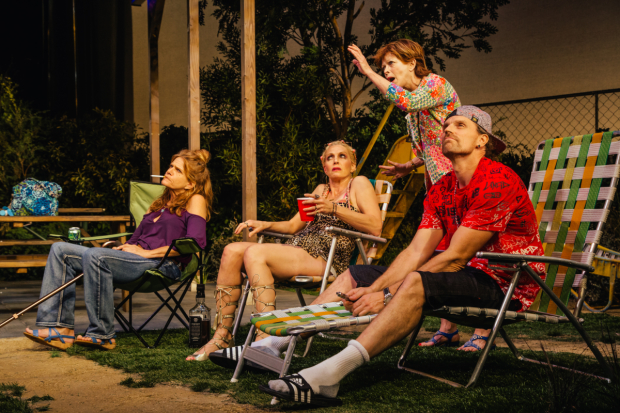Barbecue
Playwright Robert O’Hara puts the American family through the wringer at the Geffen Playhouse.

(© Jeff Lorch Photography)
The archives of American drama are stacked with depictions of families who we can be grateful are not our own. The damaged and perhaps dangerous O'Mallery clan of Robert O'Hara's Barbecue, now playing at the Geffen Playhouse, belong firmly among the ranks of these families. From its opening scene in a run-down park to its cynically starry-eyed conclusion two hours later, O'Hara's play (like the O'Mallerys) is a force to be reckoned with.
With director Colman Domingo at the helm, this wickedly delightful production is as ripe for attention as the bound-for-stardom diva at its center. That diva in question is Barbara (played by Rebecca Wisocky), who carries the unflattering nickname Zippity Boom. Her brother, James T (played by Travis Johns), and his sisters, Adlean (Dale Dickey), Marie (Elyse Mirto), and Lillie Anne (Frances Fisher), have gathered at a familiar park where they have invited wayward sis Barbara for an intervention disguised as a family cookout. With the exception of controlling Lillie Anne, who is the intervention's organizer, Barbara's siblings all have problems, diseases, and addictions of their own. Based on their tales about their drunk and crackhead sister, it's Zippity Boom who is the closest to hitting bottom.
Part way through the setup, before Barbara even arrives, the scene changes and the characters we have just met are now being played by black actors who are wearing the same costumes. Their goals remain the same — get Barbara (in this scenario played by Cherise Boothe) to rehab – but this group seems to be in even worse condition than their predecessors. Adlean (Kimberly Hebert Gregory) is a cigarette-smoking, pill-popping mess. Lillie Anne's (Yvette Cason) sanctimoniousness knows no bounds, and crack-addicted Marie (Heather Alicia Simms) has swilled so much Jack Daniels that James T (Omar J. Dorsey) subdues her with the Taser that he had brought for Barbara. "Now that's set on low," James says. "Barbara will probably need medium-high if she goes Zippity Boom."
Barbara eventually arrives, and gets the full intervention treatment, but she barely speaks a word before the end of the first act. When she finally speaks, however, the picture clears and we finally understand what is going on. O'Hara's curtain-closing twist is a doozy, the first of several, that will not be spoiled here.
Pop culturists who track a certain kind of entertainment will understand and appreciate what Barbecue is serving up. The darkly comic shades of addiction and family dysfunction are part of this stew, but they are by no means the only item on O'Hara's menu. When the two Barbaras share an encounter in the same park at the start of the second act, Barbecue moves into issues of power, image, and cultural stereotyping. Wisocky and Boothe, both excellent, make for two halves of the same diva, equally motivated by similar factors. Wisocky's powerless and intimidated white Barbara contrasts splendidly with Boothe's grandstanding gorgon. Both roles are showcases, and the actresses lay into them with gusto.
Their supporting cast members buoy them up with equal skill. You can see the exasperation practically seeping through Fisher's skin as her Lillie Ann tries to distance herself from the train wreck that is her kin. Simms and Mirto (both rocking Kara Harmon's tarty leopard print and hair designer Dave Bova's pink cornrow hairstyles) mine plenty of humor from their respective freak-outs. The very presence of Dickey (a veteran of several of Del Shores' comedies) means that Adlean is in sure hands as few actors can trailer-park it better than Dickey.
Barbecue is first and foremost a satire, and Domingo – who has worked with O’Hara both as actor and director — keeps the broadness largely under control without letting the play lose its bite. The action plays out in a finely detailed park that scenic designer Sibyl Wickersheimer has decked out with a gazebo, browning grass, a seen-better-days slide and a working grill. It’s a sweaty, depressing spot located somewhere in middle America. But with the O'Mallerys on the scene, it's going to get hotter.
O'Hara's raunchy, slang-infused dialogue is as rich as his plot, and Domingo's actors (Boothe in particular) seem to be enjoying themselves immensely. A sly and cynical play, Barbecue also happens to be hilarious. Even if your family does not resemble Zippity Boom's — and here's very much hoping it doesn't — you may end up forever distrustful of family barbecues.









